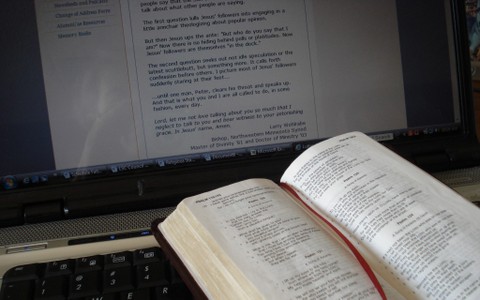Mark 14:1-9 NASB
[1] … Now the Passover and Unleavened Bread were two days away; and the chief priests and the scribes were seeking how to seize Him by stealth and kill Him; [2] for they were saying, “Not during the festival, otherwise there might be a riot of the people.” [3] While He was in Bethany at the home of Simon the leper, and reclining at the table, there came a woman with an alabaster vial of very costly perfume of pure nard; and she broke the vial and poured it over His head. [4] But some were indignantly remarking to one another, “Why has this perfume been wasted? [5] For this perfume might have been sold for over three hundred denarii, and the money given to the poor.” And they were scolding her. [6] But Jesus said, “Let her alone; why do you bother her? She has done a good deed to Me. [7] For you always have the poor with you, and whenever you wish you can do good to them; but you do not always have Me. [8] She has done what she could; she has anointed My body beforehand for the burial. [9] Truly I say to you, wherever the gospel is preached in the whole world, what this woman has done will also be spoken of in memory of her.” …
Having a clear understanding of these verses is so significant, because Jesus said that wherever the gospel is preached in the whole world, what this woman is done will also be spoken of in memory of her. Obviously then, the proclaiming of the gospel should provoke people to respond to Jesus the same way Mary of Bethany responded to him in this particular story. I want you to notice something in verse 6 where Jesus said, “She has done a good deed to me.” The word good has a primary meaning of “beautiful,” and the grammar should be “… A beautiful deed into Me.” What Mary of Bethany did in this story ministered to the heart of Jesus in a way that Jesus described as “beautiful.” I believe that Mary of Bethany, and Mary Magdalene are the same, and this is the third time that Mary of Bethany is seen anointing Jesus with the spikenard perfume. It is possible that this was Mary’s dowry given to her as a young girl to be wasted on her husband the night of the consummation of her marriage one day. This alabaster bottle of spikenard was worth possibly as much as $30,000 or more in our day. She poured out oil on his feet in Luke chapter 8, and once again anointed him in John chapter 12 after the resurrection of Lazarus. In the John passage, as well as here in Mark 14, the disciples rebuked her for wasting such valuable oil when it could have been sold and the money given for the poor. In the Mark passage she doesn’t just pour oil from the alabaster to anoint Jesus, but she actually broke the vile this time, and poured all the oil that was left on the head of Jesus. This time when the disciples rebuked her Jesus tells them the let her alone for she has done a beautiful thing to his heart. What is this all about? In the John passage Jesus told them to let her alone that she may keep the oil for the day of his burial, but in the Mark passage Jesus says that she has anointed my body before hand for the burial. The time of His burial was at hand. I believe that in a unique way, Mary of Bethany had come to understand how far the love of Jesus would take him. She was the first person Jesus revealed himself to in the resurrection, and I believe because of her encounters with his extravagant love, she loved him an extraordinarily extravagant way. The disciples rebuked her when they said “Why this waste,” but I believe Jesus was celebrating the heart of one who was wasting her life on Him, because she realized He was prepared to waste his life on her. To waste something, is the do something with what seems to be unnecessary excess, but this is exactly what the gospel is supposed to provoke; hearts that will excessively waste their lives on Jesus, in response to his extraordinary extravagant love. Tradition tells us, that Mary of Bethany never married, but spent the rest of her life wasted on Jesus alone. Breaking the alabaster vial, all she had left of her dowry, was her way of saying “I will love you back as wholeheartedly as you have loved me.”

